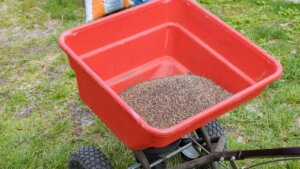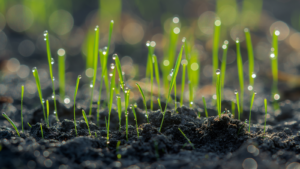Are you struggling with poor soil quality and low crop yields? Soil management is the cornerstone of a successful garden or farm. This comprehensive guide will explore effective and sustainable soil management practices that can turn your soil from drab to fab. Let’s dig in!
Importance of Soil Health Management
Soil health is more than just the foundation of a thriving garden; it’s the lifeblood of sustainable agriculture. Healthy soil provides plants with essential nutrients and organic matter for optimal growth. On the flip side, poor soil health can lead to a host of problems, including:
- Nutrient Deficiency: Lack of essential nutrients can stunt plant growth.
- Soil Erosion: Poor soil structure can lead to erosion, stripping the soil of its valuable top layer.
- Pest and Disease: Unhealthy soil can be a breeding ground for pests and diseases.
Increase Soil Organic Matter
Organic matter is the cornerstone of soil health, serving as the building block that improves various soil properties. It enhances soil structure, making it easier for plant roots to penetrate the soil. Additionally, organic matter increases the soil’s water-holding capacity and ability to retain essential nutrients. Here’s how to enrich your soil with organic matter:
Composting: Turn Your Waste into Wealth
Composting is a sustainable way to recycle kitchen waste and plant residue into valuable organic matter. This practice reduces input costs and enriches the soil with essential nutrients. Composting is a leading practice for managing soil health, as it increases the soil organic matter content, providing a habitat for beneficial soil microorganisms.
Cover Crops: The Unsung Heroes
Planting cover crops like legumes can significantly increase the amount of organic matter in the soil. These plants also play a role in nutrient cycling and soil conservation, preventing soil from erosion and improving soil aggregates. Cover crops are an agronomic best practice that contributes to sustainable agriculture practices.
Mulching: More Than Just Aesthetic
Using organic mulches like straw or wood chips to cover the surface of the soil serves multiple purposes. It keeps the soil covered and adds organic matter as the mulch decomposes. Mulching is excellent for managing soil health, as it helps in soil conservation and reduces soil compaction.
Tillage Systems: Prepare the Soil
Tillage is a traditional practice that involves turning over the soil to prepare it for planting. While it can improve soil aeration and simplify planting, it has its downsides, such as soil compaction and erosion. Here are some tillage systems to consider:
No-Till: The Conservationist’s Choice
No-till farming leaves the soil surface undisturbed, reducing soil erosion and improving water retention. This system is excellent for soil conservation and is one of the leading practices that enhance soil health. It also encourages the presence of living organisms in the soil, contributing to soil fertility.
Conservation Tillage: The Middle Ground
Conservation tillage involves minimal soil disturbance, preserving the soil structure while allowing for effective planting. This method is a compromise between traditional tillage and no-till systems. It helps to keep the soil covered, reducing the risk of erosion from wind and rain.
Crop Rotation: A Time-tested Technique
Crop rotation is an age-old technique that involves planting different types of crops in the same area over different growing seasons. This practice prevents soil-borne diseases and improves soil fertility and structure. For example:
- Year 1: Plant legumes to fix nitrogen in the soil, helping you build good soil for future crops.
- Year 2: Plant root vegetables like carrots that will benefit from the added nitrogen and improved soil structure.
Crop rotation is a management strategy that utilizes several types of crops to improve soil health. It’s a practice that has stood the test of time and remains one of the best practices for sustainable soil management.
Fertilizers in Soil Management
Fertilizers play a crucial role in the management of soils, especially when it comes to providing the essential nutrients that plants need for optimal growth. However, it’s important to understand that not all fertilizers are the same. The type of fertilizer you choose can significantly impact soil health, crop growth and yield, and even pest management.
Organic Fertilizers: Nature’s Gift to Soil
Organic fertilizers, such as manure, compost, and bone meal, are derived from natural sources. These fertilizers release nutrients slowly into the soil, improving its structure and health. Organic matter improves the soil’s water-holding capacity and provides a habitat for beneficial soil organisms. To understand the soil pH and nutrient levels, soil testing is recommended before applying organic fertilizers. This helps the grower plan effectively, ensuring the right amount of soil nutrients is maintained.
Organic fertilizers are particularly beneficial for cropland that has been depleted or lacks essential nutrients. They add organic matter to the soil, improving soil particles and reducing the chances of soil becoming compacted.
Synthetic Fertilizers: Quick but Cautious
Synthetic fertilizers are chemically produced and contain specific nutrients like nitrogen and phosphorus. These fertilizers offer the advantage of quick nutrient release, which can benefit short-term crop growth. However, they can also harm soil microbes that provide nutrients and may lead to compacted soil if not managed carefully.
Following a well-planned fertilizer management plan when using synthetic options is essential. Overuse can lead to an imbalance in soil pH and may even harm the soil organisms that contribute to soil health. Using cover crops alongside synthetic fertilizers can help mitigate some of these risks by adding organic matter to the soil and improving its overall structure.
In summary, both organic and synthetic fertilizers have their place in soil management. The key is to understand the specific needs of your soil and crops and to manage fertilizers to maximize benefits while minimizing risks. This balanced approach will contribute to sustainable soil management, ensuring quality and crop yield for future seasons.
Ready to Improve Soil in Your Garden?
Soil management is not just about making your garden look good; it’s about providing the essential nutrients your plants need to grow strong and resist diseases. If you still have questions or need professional guidance, don’t hesitate to contact Terra Lawn Care. Our team of experts is always here to help you achieve the lush, green garden of your dreams. Call us today, and let’s make your soil the talk of the town!



